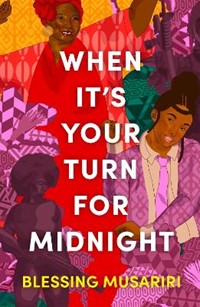Blessing Musariri


About Author
Award-winning author Blessing Musariri's new YA novel, When It's Your Turn for Midnight, draws on the Zimbabwean civil war in a rich story about family, belonging and inheritance.
Blessing writes short stories, children’s stories, radio and screenplays, and contemporary adult fiction. Her work has also been published by the Guardian, Granta, and Poetry International. She lives in Harare, Zimbabwe.
Interview
When It's Your Turn for Midnight (Zephyr)
November 2024
When teenager Chianti discovers a family secret, she feels that her life has fallen apart but, with her grandmother's guiding hand, she finds a way back to a new normal and a richer experience of her family and community.
When It's Your Turn for Midnight is a rewarding and positive story about change and navigating a way through unexpected events and obstacles that life sometimes throws at us. Its setting, in Zimbabwe, brings a rich layer of detail to the novel.
ReadingZone spoke with author Blessing Musariri about the inspiration for When It's Your Turn for Midnight, the themes it explores and drawing on her Zimbabwean heritage in her writing.

Q&A with Blessing Musariri, exploring When It's Your Turn for Midnight
"I chose the title because there comes a point in everyone's life when there is a turn from one thing to another
(as night begins to clock into a new day) that can change everything as you knew it."
1. Thank you for joining us on ReadingZone! Can you tell us about yourself and how you developed as a writer? What kinds of themes and ideas do you enjoy exploring in your books?
I grew up an avid reader. Saturdays were library days for us kids while my mother ran her errands in town. I was a very fanciful child, always weaving stories and adventures for my friends and siblings. We played outdoors and roamed our neighbourhood, climbing trees, playing ball and rope games and our versions of hopscotch. We were always a group so we never ran out of things to do outside the house.
I love to write stories that are full of colour and texture. I enjoy infusing humour that comes naturally and is sometimes just below the surface. I love exuberant characters and layered storylines that evolve as the story progresses. I love surprising my readers.
2. What is life like in Zimbabwe today, and what do you love most about it? How do you draw on your Zimbabwean heritage in your books, and why you feel it's important for you to do so?
Life in Zimbabwe is very different from how it was in my childhood up to about 15 years ago. Things took a turn in 2008 when our economy crashed and since then it's been a bit of spiral. Life can be very good here or extremely challenging and frustrating, depending on circumstances.
I love that I can eat fresh and organic food everyday that grows in our garden or can be bought from numerous markets around us. I love that I have family and friends and that I can have a conversation with anyone anytime wherever I go.
I use my characters to draw on my heritage because they are all people we know going through situations that we all recognise or can identify with, but expressing themselves in a manner that is particular to Zimbabweans. I feel it's important to be authentic to the place and the people because readers will feel the truth that lies at the heart of the story that way.
3. Do you have any writing tips for those with dual heritage to draw on their experiences and cultures in their writing?
I like to find the humour that's particular to my characters according to 'their' heritage, the things that everyone will recognise and relate to when they look at their own lives and heritage. We're all basically having the same experiences as human beings, just in different surroundings, and it's these different circumstances that are interesting when highlighted and used to explore what is central to all of us.
4. What happens in your new book, When It's Your Turn for Midnight, and how absorbed do you become in your characters and settings? Can you also tell us why you chose this title?
In this new book, a young girl discovers the truth about her father and it changes her life. Left to figure things through on her own, she turns to her beloved grandmother who she sees as a strong and independent woman who will support and help her through the crisis.
I become one hundred per cent absorbed in my characters and their settings because, in order to put them down convincingly on paper, I have to allow them to say what they want to say and take steps they want to take, which means I have to let go of my own thoughts about who they are and what is happening around them. The minute I try to make a character do what I want them to do, the story stops flowing.
I chose the title because there comes a point in everyone's life when there is a turn from one thing to another (as night begins to clock into a new day) that can change everything as you knew it.
5. How did your main character, Chianti, develop, and why have you written the book from her perspective?
Chianti develops from someone who has tried very hard all her life to be good and to keep from being disruptive. At her grandmothers' she learns that life is not always so well ordered and that's not necessarily a bad thing. She learns that even when you're good, bad things can still happen but that's not the end of everything. Life changes, but you can overcome great obstacles by taking action to control and make the most of what is available to you. I wrote the book from her perspective because she's the character most affected by the big change in their lives.
6. Can you tell us a little about the period and events the book draws on, and how you researched the Zimbabwe War of Liberation? Why did you want to explore this period through women's experiences and perspectives?
The Zimbabwe War of Liberation took place from 1964 to 1979. Zimbabwean freedom fighters took to the bush to fight against white minority rule under the government of Ian Smith. It was a very significant time in the history of Zimbabwe because it was after gaining Independence that the country was known as Zimbabwe. Before that it had been named Rhodesia, after Cecil John Rhodes, a coloniser.
I was born six years before the war ended and felt its effects during my childhood, as my parents were detained in the stockades for assisting the freedom fighters (referred to at the time as terrorists). We felt the after-effects of the war during our school years as racial tensions were still present in our everyday lives and up to today, people who fought in the war are still alive and the stories of that time are still very much a part of their personal stories.
I always wanted to know more about the time because of my own memories and impressions as a child and also because many of the relationships formed during those years have formed the basis of how we are all connected socially and sometimes politically in this country. I find the women who fought during this time extremely fascinating and interesting to be around because they are open, unapologetic and fun to be around but I know that they all have those traumatic memories hidden away behind their daily lives.
Out of interest, and as a writer, when several people approached me for assistance in writing their war memoirs I helped them, but it was more men than women who wanted to record their stories and so I wanted to feature women in a story that many people will get to read. Working on these memoirs is how I obtained more close up knowledge and understanding of the time.
7. There's a lovely intergenerational aspect to this story - can you tell us how this developed and how it reflects Zimbabwean culture? Who is your favourite supporting character in the story?
This developed naturally because that's how life is in Zimbabwe. Our lives are for the most part inter-generational and have always been, as families operate on strict hierarchical principles and family support and input is required and expected at all levels of life's progressions and milestones.
My favourite supporting character is Taren because while she's a handful, she's the most true to herself.
8. While the book looks over its shoulder at the past, When It's Your Turn for Midnight is a very contemporary story. What would you like your readers to take from Chianti's experiences?
I would like the wider audience to take away from the story that everyone is going through something at any given time, even when it's not apparent on the surface. That even when life switches up on you, you can survive it and learn to define your own normal. That family isn't necessarily only who is related to you and how but who is around you that keeps you whole. And also that your value as a person is not determined by the circumstances of your birth but by how you live your life and what value you assign to who and what is in it.
9. Where and when do you prefer to write? What are you working on currently?
I prefer to write in my little office that used to be a tiny storeroom off the garage. It feels like a cosy cocoon. I'm currently working on an adult fiction novel while thinking about my next YA story.
10. What do you enjoy doing to re-charge when you're away from your desk?
I enjoy travelling - especially to beach locations, reading and fine dining, but usually what I can afford is cooking something nice myself and having it with a glass of wine at home. I also enjoy making artsy things.
 When It's Your Turn For Midnight
When It's Your Turn For Midnight
 All That It Ever Meant
All That It Ever Meant
